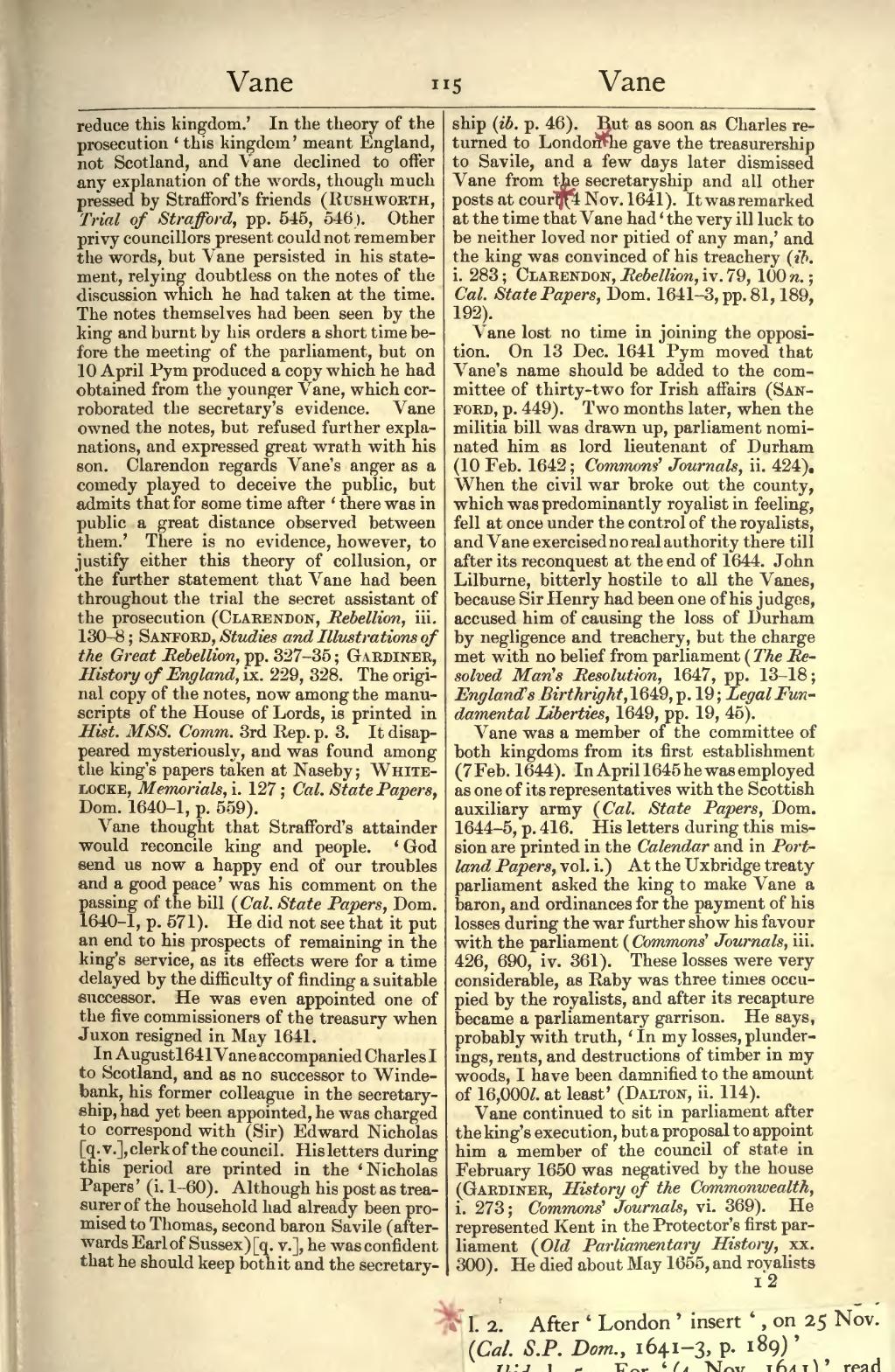reduce this kingdom.’ In the theory of the prosecution ‘this kingdom’ meant England, not Scotland, and Vane declined to offer any explanation of the words, though much pressed by Strafford's friends (Rushworth, Trial of Strafford, pp. 545, 546). Other privy councillors present could not remember the words, but Vane persisted in his statement, relying doubtless on the notes of the discussion which he had taken at the time. The notes themselves had been seen by the king and burnt by his orders a short time before the meeting of the parliament, but on 10 April Pym produced a copy which he had obtained from the younger Vane, which corroborated the secretary's evidence. Vane owned the notes, but refused further explanations, and expressed great wrath with his son. Clarendon regards Vane's anger as a comedy played to deceive the public, but admits that for some time after ‘there was in public a great distance observed between them.’ There is no evidence, however, to justify either this theory of collusion, or the further statement that Vane had been throughout the trial the secret assistant of the prosecution (Clarendon, Rebellion, iii. 130–8; Sanford, Studies and Illustrations of the Great Rebellion, pp. 327–35; Gardiner, History of England, ix. 229, 328. The original copy of the notes, now among the manuscripts of the House of Lords, is printed in Hist. MSS. Comm. 3rd Rep. p. 3. It disappeared mysteriously, and was found among the king's papers taken at Naseby; Whitelocke, Memorials, i. 127; Cal. State Papers, Dom. 1640–1, p. 559).
Vane thought that Strafford's attainder would reconcile king and people. ‘God send us now a happy end of our troubles and a good peace’ was his comment on the passing of the bill (Cal. State Papers, Dom. 1640–1, p. 571). He did not see that it put an end to his prospects of remaining in the king's service, as its effects were for a time delayed by the difficulty of finding a suitable successor. He was even appointed one of the five commissioners of the treasury when Juxon resigned in May 1641.
In August 1641 Vane accompanied Charles I to Scotland, and as no successor to Windebank, his former colleague in the secretaryship, had yet been appointed, he was charged to correspond with (Sir) Edward Nicholas [q. v.], clerk of the council. His letters during this period are printed in the ‘Nicholas Papers’ (i. 1–60). Although his post as treasurer of the household had already been promised to Thomas, second baron Savile (afterwards Earl of Sussex) [q. v.], he was confident that he should keep both it and the secretaryship (ib. p. 46). But as soon as Charles returned to London he gave the treasurership to Savile, and a few days later dismissed Vane from the secretaryship and all other posts at court (4 Nov. 1641). It was remarked at the time that Vane had ‘the very ill luck to be neither loved nor pitied of any man,’ and the king was convinced of his treachery (ib. i. 283; Clarendon, Rebellion, iv. 79, 100 n.; Cal. State Papers, Dom. 1641–3, pp. 81, 189, 192).
Vane lost no time in joining the opposition. On 13 Dec. 1641 Pym moved that Vane's name should be added to the committee of thirty-two for Irish affairs (Sanford, p. 449). Two months later, when the militia bill was drawn up, parliament nominated him as lord lieutenant of Durham (10 Feb. 1642; Commons' Journals, ii. 424). When the civil war broke out the county, which was predominantly royalist in feeling, fell at once under the control of the royalists, and Vane exercised no real authority there till after its reconquest at the end of 1644. John Lilburne, bitterly hostile to all the Vanes, because Sir Henry had been one of his judges, accused him of causing the loss of Durham by negligence and treachery, but the charge met with no belief from parliament (The Resolved Man's Resolution, 1647, pp. 13–18; England's Birthright, 1649, p. 19; Legal Fundamental Liberties, 1649, pp. 19, 45).
Vane was a member of the committee of both kingdoms from its first establishment (7 Feb. 1644). In April 1645 he was employed as one of its representatives with the Scottish auxiliary army (Cal. State Papers, Dom. 1644–5, p. 416. His letters during this mission are printed in the Calendar and in Portland Papers, vol. i.) At the Uxbridge treaty parliament asked the king to make Vane a baron, and ordinances for the payment of his losses during the war further show his favour with the parliament (Commons' Journals, iii. 426, 690, iv. 361). These losses were very considerable, as Raby was three times occupied by the royalists, and after its recapture became a parliamentary garrison. He says, probably with truth, ‘In my losses, plunderings, rents, and destructions of timber in my woods, I have been damnified to the amount of 16,000l. at least’ (Dalton, ii. 114).
Vane continued to sit in parliament after the king's execution, but a proposal to appoint him a member of the council of state in February 1650 was negatived by the house (Gardiner, History of the Commonwealth, i. 273; Commons' Journals, vi. 369). He represented Kent in the Protector's first parliament (Old Parliamentary History, xx. 300). He died about May 1655, and royalists
